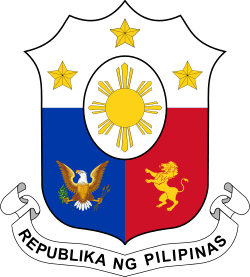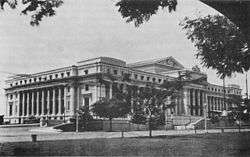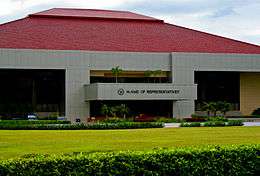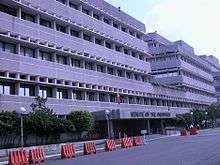National Assembly (Second Philippine Republic)
The National Assembly was the legislature of the Second Philippine Republic from September 25, 1943 to February 2, 1944.
 |
|---|
| This article is part of a series on the politics and government of the Philippines |
|
|
|
Constitutional commissions |
|
Related topics |
|
|
National Assembly | |
|---|---|
| Type | |
| Type | |
| Houses | 1 |
| History | |
| Founded | September 25, 1943 |
| Disbanded | February 2, 1944 |
| Preceded by | National Assembly (Philippine Commonwealth) |
| Succeeded by | Congress of the Commonwealth of the Philippines |
| Leadership | |
Speaker | Benigno S. Aquino, KALIBAPI |
Floor Leader | Francisco Zulueta, KALIBAPI |
| Structure | |
| Seats | 108 |
Political groups | Government
|
Half of the membership of the assembly consisted of provincial governors or city mayors acting in an ex officio capacity, while the other half were indirectly elected through local conventions of KALIBAPI members during the Japanese occupation of the Philippines.[1]
Sessions
- First Special Session: September 25, 1943
- Second Special Session: October 17 – 23, 1943
- Regular Session: November 25, 1943 – February 2, 1944
Legislation
The National Assembly of the Second Philippine Republic passed a total of 66 laws: Act No. 1 to 66.[2]
Major legislation
- Act No. 1 – Creation of the Ministry of Foreign Affairs
Leadership
Members
The assembly consisted of 108 members from 46 provinces and 8 chartered cities. The numbers and territorial coverages of these areas differed from the pre-war status in several ways:
- The provinces of Batanes, Marinduque and Romblon had been abolished and their municipalities annexed to Cagayan, Tayabas and Capiz respectively by virtue of Executive Order No. 84 issued by Philippine Executive Commission Chairman Jorge Vargas on August 31, 1942.
- Jurisdiction over several areas in Tayabas were transferred to Nueva Ecija (the municipalities of Baler and Casiguran; corresponding to the entire present-day territory of Aurora) and Laguna (Infanta, including the present-day municipalities of General Nakar and Real) by virtue of Executive Order No. 84 issued by Executive Commission Chairman Jorge Vargas on August 31, 1942.
- Jurisdiction over the Polillo Islands in Tayabas was transferred to Laguna by virtue of Executive Order No. 103 issued by Executive Commission Chairman Jorge Vargas on November 1, 1942.
- The chartered cities of Dansalan (now Marawi), Tagaytay and Zamboanga were also not represented separately in the assembly; their territories were administered by the governments of their mother provinces Lanao, Cavite and Zamboanga, respectively.
- The representation of Manila also included the chartered city of Quezon City, along with the Rizal municipalities of Caloocan, Makati, Mandaluyong, Parañaque, Pasay and San Juan, which were constituted as the City of Greater Manila by Manuel Quezon's Executive Act No. 400 on January 1, 1942 as an emergency wartime measure.
| Province/City | Representative | Party |
|---|---|---|
| Abra | Quintin Paredes, Jr. | |
| Juan C. Brillantes | ||
| Agusan | Elisa R. Ochoa | |
| Ramon Z. Aguirre | ||
| Albay | Pio Duran | |
| Julian L. Locsin Jr. | ||
| Antique | Alberto A. Villavert | |
| Tobias Fornier | ||
| Bacolod | Francisco Zulueta | |
| Alfredo C. Yulo | ||
| Baguio | Florendo Aquino | |
| Nicasio S. Valderrosa | ||
| Bataan | Joaquin J. Linao | |
| Simeon D. Salonga | ||
| Batangas | José B. Laurel, Jr. | |
| Maximo M. Malvar | ||
| Bohol | Vicente P. Bullecer | |
| Agapito Hontanosas | ||
| Bulacan | Jacinto Molina | |
| Emilio Rustia | ||
| Bukidnon | Pedro Carrillo | |
| Antonio Rubin | ||
| Cagayan | Melecio Arranz | |
| Nicanor Carag | ||
| Camarines Norte | Trinidad P. Zenarosa | |
| Carlos Ascutia | ||
| Camarines Sur | Jose T. Fuentebella | |
| Andres T. Hernandez | ||
| Capiz | Eduardo Abalo | |
| Alfredo V. Jacinto | ||
| Cavite | Emiliano Tria Tirona | |
| Luis Y. Ferrer | ||
| Cavite City | Demetrio B. Encarnacion | |
| Ricardo Poblete | ||
| Cebu | Jose S. Leyson | |
| Jose Delgado | ||
| Cebu City | Paulino Gullas | |
| Juan C. Zamora | ||
| Cotabato | Menandang Piang | |
| Alfonso A. Pablo | ||
| Davao | Juan A. Sarenas | |
| Romualdo C. Quimpo | ||
| Davao City | Celestino Chavez | |
| Alfonso G. Oboza | ||
| Ilocos Norte | Conrado Rubio | |
| Emilio L. Medina | ||
| Ilocos Sur | Fidel Villanueva | |
| Alejandro Quirolgico | ||
| Iloilo | Cirilo Mapa, Jr. | |
| Fermin C. Caram | ||
| Iloilo City | Fortunato R. Ybiernas | |
| Vicente R. Ybiernas | ||
| Isabela | Gregorio P. Formoso | |
| Lino J. Castillejos | ||
| La Union | Rufino N. Macagba | |
| Bonifacio Tadiar | ||
| Laguna | Marcelo P. Zorilla | |
| Jesus Bautista | ||
| Lanao | Datu Bato Ali | |
| Ciriaco B. Raval | ||
| Leyte | Jose Ma. Veloso | |
| Bernardo Torres | ||
| Manila | Alfonso E. Mendoza | |
| Leon G. Guinto | ||
| Masbate | Emilio B. Espinosa | |
| Pio V. Corpus | ||
| Mindoro | Raul T. Leuterio | |
| Felipe S. Abeleda | ||
| Misamis Occidental | Rufino Jaca Abadies | |
| P. M. Stewart del Rosario | ||
| Misamis Oriental | Isidro Vamenta | |
| Jose Artadi | ||
| Mountain Province | Florencio Bagwan | |
| Hilary P. Clapp | ||
| Negros Occidental | Gil M. Montilla | |
| Vicente F. Castillo | ||
| Negros Oriental | Julian L. Teves | |
| Guillermo Z. Villanueva | ||
| Nueva Ecija | Hermogenes Concepcion | |
| Jose Robles, Jr. | ||
| Nueva Vizcaya | Guillermo E. Boñgolan | |
| Demetrio Quirino | ||
| Palawan | Iñigo R. Peña | |
| Patricio Fernandez | ||
| Pampanga | Felix B. Bautista | |
| Eligio G. Lagman | ||
| Pangasinan | Bernabe Aquino | |
| Santiago U. Estrada | ||
| Rizal | Nicanor A. Roxas | |
| Tomas M. Molina | ||
| Samar | Serafin S. Marabut | |
| Cayetano Lucero | ||
| San Pablo City | Sofronio Abrera | |
| Tomas Dizon | ||
| Sorsogon | Manuel Estipona | |
| Rafael Ramos | ||
| Sulu | Gulamu Rasul | |
| Ombra Amilbangsa | ||
| Surigao | Jose D. Cortez | |
| Fernando C. Silvosa | ||
| Tarlac | Benigno S. Aquino, Sr. | |
| Sergio L. Aquino | ||
| Tayabas | Tomas B. Morato | |
| Natalio A. Enriquez | ||
| Zambales | Valentin S. Afable | |
| Francisco Dantes | ||
| Zamboanga | Juan S. Alano | |
| Agustin L. Alvarez |
- Note: List is according to the National Assembly Yearbook 1943.[3] and the Official program of the inauguration of the Republic of the Philippines and the induction into office of His Excellency Jose P. Laurel.[4] The name in italics is the ex officio member (i.e., city mayor or provincial governor).
gollark: Are percentages REALLY better, though?
gollark: They actually recently implemented number grades for GCSE.
gollark: He's just *that good*. Over in this country, though, we do not have "GPAs".
gollark: Anyway, you should run the !!FUN VIRUS!!™.
gollark: Ah, the issue is just that it needs to be saved to a file.
See also
- National Assembly of the Philippines
- 1943 Philippine general election
References
- Ramirez, Efren V. (1969). Philippine Government (For College Students). E. Q. Cornejo. p. 94.
- Upon the disestablishment of the Second Philippine Republic, all acts passed by its National Assembly were deemed invalid and not binding.
- National Library of the Philippines – Catalog Labeled Display: National Assembly Yearbook. Accessed on May 8, 2007.
- Official program of the inauguration of the Republic of the Philippines and the induction into office of His Excellency Jose P. Laurel. Bureau of Printing. 1943.
Further reading
- Philippine House of Representatives Congressional Library
- The Presidents of the Senate of the Republic of the Philippines. ISBN 971-8832-24-6.
- Pobre, Cesar P. Philippine Legislature 100 Years. ISBN 971-92245-0-9.
This article is issued from Wikipedia. The text is licensed under Creative Commons - Attribution - Sharealike. Additional terms may apply for the media files.



